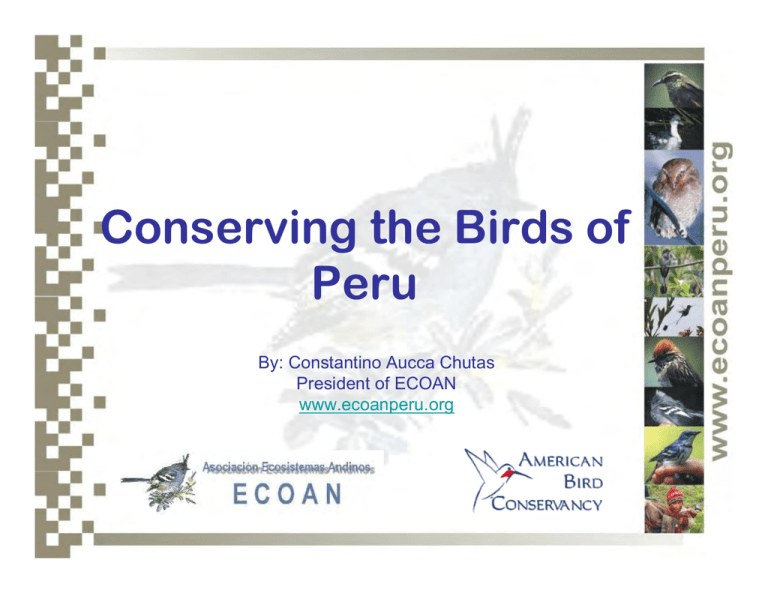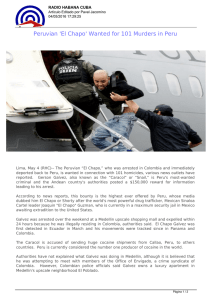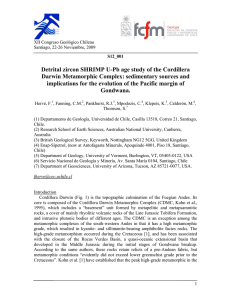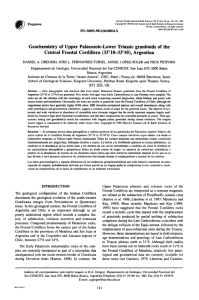Diapositiva 1
Anuncio

Conserving the Birds of Peru By: Constantino Aucca Chutas President of ECOAN www.ecoanperu.org Our Mission: “To Conserve at perpetuity the Plant and Animal Species from Peru, as well as the wetlands, migratory bird species and representative samples of the country’s ecosystems, through integrated strategies that may include strict protection of biodiversity, sustainable use of natural resources and community-based conservation.” What was done? Who takes priority? ECOAN´s Project: We are working in five areas in Northern, Central and Southern Perú General objective • Protect the Polylepis forests of Perú with full participation of local communities; Corredor de Conchucos Cordillera de Vilcabamba Cordillera de Vilcanota Cordillera de Apurimac Proyecto binacional Perú-Bolivia Specific Objectives • Mapping and measuring Polylepis Forests; • Study the population structure and Dynamic; • Flora inventories and community structure; • Fauna inventories: Birds Insects Mammals Birds of Highest Conservation Priority White-browed Tit-Spinetail (Leptasthenura xenothorax) • After exploring 629 ha of forest, only 305 individuals were reported; • Only in Cusco and Apurimac areas; • Endangered status according to Peru’s Gov, BirdLife International, UICN, etc. Ash-breasted Tit-Tyrant (Anairetes alpinus) • Reported for Peru and Bolivia • Highest concentrations in the Polylepis woodlands of southeastern Peru • Endemic specialist with reported population of 431 individuals in 629 ha of forest; • Endangered status according to the Peru Gov, BirdLife International, IUCN, etc. Royal Cinclodes (Cinclodes aricomae) • In Peru and Bolivia • Some authors indicate a reproductive pair for each two hectares of pristine Polylepis forest; • Feeds in mossy, hyperhumid areas within the forest; • 189 individuals were recorded in less than 629 ha of forest explored (C. Aucca, unpublished); • Critical endangered status according to Peru Gov, BirdLife International, IUCN and AZE. Current situation of the three species Location Area (ha) Polylepis species Cinclodes aricomae Leptasthenura xenothorax Anairetes alpinus Cordillera Vilcanota 377 5 116 205 181 Cordillera Vilcabamba 176 3 30 36 33 Cordillera Apurimac 68 2 41 64 195 Cordillera Carabaya 7 1 2 - 22 Corredor Conchucos - 4 - - 30 629 6 189 305 461 Total Project: Community-based Polylepis Conservation in the Vilcanota Cordillera: Community Reserves? • Upper parts of the Vilcanota Mountains (3500 – 4500 m), Cusco Department. • Since 1999, we work with local communities on conservation activities; • Today, 1,498 families from of 17 communities in the Provinces of Calca and Urubamba are involved and benefited. Proyecto: Reserva comunal de los Bosques de Polylepis en la Cordillera de Vilcanota Fire wood Trade-off in the C.C. Abra Málaga Tastayoc Objective: • Decrease the destruction of the few Polylepis forest remnants by providing an alternative solution to energy needs. Fire wood Provided in 2004 Number of Families 100 units (Eucalipto 70 cm. x 10 cm.) 31 200 units 11 Total ‘Cargas’ to the Community 53 MONTHLY AVERAGE PROVIDED (KILOGRAMS) Fire wood Unit 2.3 Kg. 1’ Carga’ (approx. 100 units) 230 Kg. 53 ‘cargas’ 12,190 Kg. Monthly Tiotal 12 tons Reforestation campaigns Objectives: • Restore deforested areas inside and out side of the Polylepis forests; • Sustainable use of the Polylepis forests; • Emergency reforestations with Eucaliptus trees for energy and construction activities; • Community participation in all the campaign activities. Donation of Energy-efficient Clay Stoves Objectives: • Reduce demand of Polylepis fire wood; • More efficient use of fire wood; • Promote use of other plant species. Nº Comunidad Campesina Nº de Cocinillas 01 Cancha – Cancha 48 02 Chupani - Chaullaccocha 82 03 Anexo San Juan 62 04 Abra Málaga – T’astayoc 40 05 Quishuarani 46 06 Tambohuaylla 61 07 Cuncani 73 08 Huacahuasi 186 09 Yanamayo 73 10 Huilloc 210 11 Patacancha 105 12 Rumira-Sondormayo 40 TOTAL 1,023 Construction of Green Houses Objectives • Provide for improved diet alternatives to the local people; • Promote new agriculture alternatives for extra income. COMUNIDAD CAMPESINA Nº de Invernaderos Cancha – Cancha 02 Quishuarani 01 Abra Málaga – T’astayoc 02 Cuncani 01 Anexo San Juan B. 01 TOTAL 07 Health Campaigns Objetives: • Build bridges with local communities; • Prevention of several types of diseases; • Improve community perspectives on external cooperation; • Create a positive attitude toward potential improvements. NEXT STEPS: 1- Detailed evaluation of this project, based on a rigorous analysis of data collected during the past five years; 2- Identify and implement long-term sustainability mechanisms for the project; 3- Ensure mid-term full appropriation of the project by the communities and an adequate exit strategy for ECOAN; 4- Replicate this experience in areas with similar ecological and social conditions. Junin Greebe Project • Endemic of Peru (restricted to Junin Lake) • Critically Endangered (Junin Lake extremely polluted) • Important mining interests in all the area • Monitoring program started 05 months ago Northen Peru Project The Northern Peru project is an iniciative between American Bird Conservancy-ABC and Asociación Ecosistemas Andinos-ECOAN to protect: - Highest Biodiverssity area. - Many AZE species -Critical Risk for the area - New Institutional Challenge AMAZONAS: Comunidad Campesina San Lucas de Pomacochas, Comunidad Campesina de Shipasbamba, Sector de Abra Patricia y Sector Alto Nieva. SAN MARTIN: Bosque de Protección Alto Mayo. Threats - Deforestation - Fires - Loging - Collection of wild species - Illegal traficants of land Estrategies: - Creation of a Private Conservation Area at Abra Patricia – Alto Nieva. - Conservation Concesión at the Alto Mayo Protected Forest Buffer zone. - Establish a Conservation Easement with the Community of Pomacochas. - Implement a Restoration Campaign Pomacochas - 25,000 trees Nursery house producing over 70,000 seedlings. Shipasbamba - 10,000 trees Nursery house producing over 30,000 seedlings. - Implement a Monitoring Program to study the Ecology of the AZE species - Workshops and develop activities to sensitaze on the Conservation objetives to protect their envinroment. - Ecolodge at Abra Patricia - Interpretation Center at PomacochasHuembo • • Agreements with local, regional, national and international Institutions to protect and save more areas. Participating in and Promoting Ecotourism Workshops,Ornitological Congresses, Regional workshops Monitoring of Neotropical Migratory Birds







